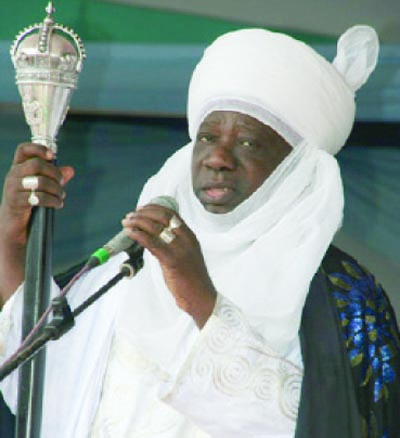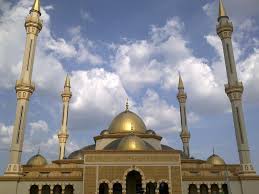It was glamour last weekend when the Shehu Alimi Islamic Foundation (SAIF) under the auspices of the Emir of Ilorin, Alhaji Ibrahim Zulu Gambari, hosted participants of Kwara State in the just concluded National Qur’anic Recitation Competition. Weekly Trust reports.
The frontage of the emir’s palace in Ilorin, the state capital was filled to capacity with guests from all walks of life that looked resplendent in different Islamic attires. The old and the young, male and female all converged to celebrate what the community and its people cherish most, the Qur’an.
An outsider would have wondered why such a huge celebration was being staged for the participants of the Qur’anic competition but to a typical Ilorin person or those who understand the city’s culture, the merrymaking was an affirmation of the place of the Quran in the identity of the emirate. The Qur’an, which is the Muslim holy book, containing the words and commandments of Allah to mankind, is a symbol of Ilorin emirate’s Islamic identity.
If Ilorin, a predominantly Islamic city, is widely known as a community of scholars, the deep knowledge of the holy Quran is not in doubt. This also reflects in the dynamism employed in Qur’anic recitation using different tones identified with prominent scholars within the emirate and its environs.
Thus, the reception organised for the state winners of the competition was attended by prominent political leaders and scholars within and outside the community. The presence of Kwara State Governor Abdulfatah Ahmed did not only add colour to the event, it signposted his belief in the holiness of Qur’an and the cultural heritage of the people of Ilorin emirate.
The reception ceremony however, coincided with the loss of the chairman of the Qur’an Competition Committee, the 88-year-old Alhaji Abdulsalam Ayinla Ayilara, who passed on penultimate Tuesday, three days to the programme.
Ayilara, according to the community, was one of the prominent sons of Ilorin emirate who worked tirelessly for the promotion of Qur’anic learning by providing an apartment in his house to camp participants representing the state annually at the competition.
While mourning the deceased, the community deemed it fit to carry on with his legacy by celebrating the winners of the competition and preserving the emirate’s cultural identity. Several Islamic groups and key figures in the state graced the occasion.
As the governor and emir were seated, the awardees rode on different horses majestically to the venue, signaling the start of the programme with the recitation of the Qur’an rendered by the Ajanasi Agba (chief translator) of Ilorin. His rendition also reminded many of the creativity with which Ilorin people introduce to Qua’rnic recitation, using tones and pitches that make it interesting to listeners.
In addition, there was the traditional Mad’hu Nabiy (praises of Prophet Mohammed) while a local Islamic musician entertained the guests and emphasised the need to jealously guard the tradition of Ilorin emirate and ensure that the Qur’anic culture is preserved for generations yet unborn.
Alhaji AbdulHamid Adi, national president of Ilorin Emirate Descendants’ Progressives Union, a socio-cultural organisation of Ilorin emirate indigenes at home and abroad, explained that the Qur’an is like the heart and soul of Ilorin. He said the annual celebration of the winners of the competition was aimed at encouraging others to memorise and learn the Qur’an.
“Qur’an in Ilorin is so important that the life within the emirate revolves round the holy Qur’an, not necessarily being the sharia thing but Qur’an is so important that you can use it to cure yourself, you can use it to have knowledge and you can use it to even pray to Allah. Anything in Ilorin without the Qur’an is nothing and it is not important to us. It is more or less the heart of Ilorin. This culture must not die. So that is why it is being organised every year to encourage people, to promote it so that we don’t allow it to die,” Adi told Weekly Trust.
Chairman of Shehu Alimi Islamic Foundation, who doubles as chairman of the state Arabic Board, Dr. Abdulrasaq Oba Sholagberu, said the reception was part of the drive to sustain the rich cultures and traditions of Ilorin emirate and called on other traditional rulers in the state to promote the Islamic culture in their domains to serve as a recipe for various societal ills.
The Qur’an has incontrovertibly stipulated rules and regulations for a Muslim to live a pious life. It forbids evil and encourages virtuous deeds. Alhaji Yusuf Lanre Badmas, a professor of Islamic Studies at the University of Ilorin in his inaugural lecture titled ‘Utilising the Qur’an, Stabilising the Society,’ said: “If the Qur’an as a great treasure had been allowed to influence this life of ours, humankind would not have undergone and experienced series of the past and present calamities.”
Therefore, for Ilorin emirate indigenes, it is one thing to celebrate the Qur’an and it is another to allow the teachings of the holy book permeate their entire lives. This was the kernel of the message by Governor Ahmed, who advised parents to give their children and wards Qur’anic education alongside its Western counterpart.
The governor, who observed that Islam was undergoing what he described as a global test, stressed the need for adherents to change the wrong perceptions of non-Muslims about their religion by using Islam as a tool for positive change the world over.
“And the only way to achieve this is to make the glorious Qur’an our guiding principle and emulate the sterling qualities of Prophet Mohammad. Islam also respects the rights of adherents of other religions without discriminating against them,” the governor said.
The Emir of Ilorin, who said he was impressed by the performance of the state representatives at the annual Qur’anic contest, stated that he would continue to accord the participants respect and honour as ambassadors of the community. He then called on sons and daughters of Ilorin to promote the rich culture of the emirate by shunning acts capable of tarnishing the image of the ancient town.
It was a glorious day for the eight participants with three of them, Abdur-Rofih Abdulwahab Nagari, Murtado Katibi Olatunji and Aayatulahi Nagari, emerging winners in different categories. They were dazzled with different gifts, including laptops and money, as a way of appreciating them and encouraging their peers to memorise the Qur’an.
Sources: Weekly Trust May 14, 2015













